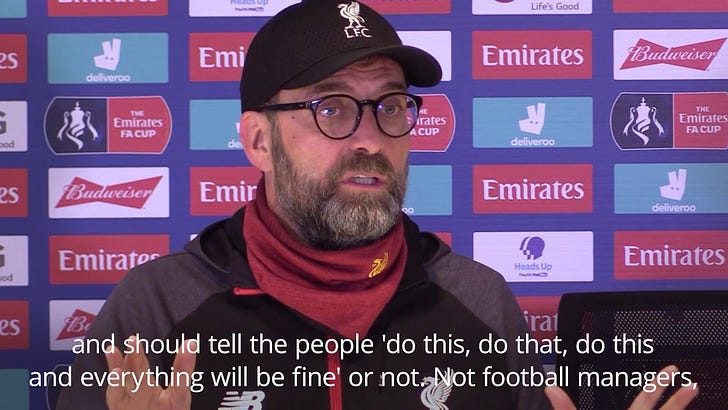Another week, another few celebs caught in the eye of a ‘they’re not allowed to have opinions’ hurricane. I know I promised you something higher-brow, but my Antidoter nomination this week is Jurgen Klopp. (note - unwittingly topical given today’s breaking news).
Last year, it was out with unicorns/ Minecraft in our house and in with Liverpool FC, but I take little interest over and above where I might find second-hand merch. The LFC manager’s nomination is because I stumbled across this old 1-min video of him pushing back brilliantly at a press conference on a question about Covid.
‘Politics, coronavirus, why me? I wear a baseball cap and have a bad shave’.
How refreshingly rare.
Celebrities now have to take a ‘position’ on topical issues despite the certainty that they will be both lauded and condemned for whatever they say. It’s of course a (cynical?) strategy to stay relevant and in the headlines, but a tightrope to walk for both celebrities and businesses. Activism is in vogue, as powerfully parodied by Ricky Gervais in his Golden Globe ‘come up, accept your little award, thank your agent, and your god and f*ck off’ speech. But not saying anything at all can also come with risks. Silence is violence?
There’s inevitably a conflict in all of us on this - especially for those like me who lean instinctively towards free speech as the optimal, if imperfect solution. We might find we have no problem with celebrities whose opinions we share and who we appreciate for giving them visibility whilst simultaneously being quick to disparage as ignorant those with opinions we don’t. We all hold strong opinions, so why shouldn’t the famous share theirs? Especially if borne from genuine concern or fear. The problem is that their influence can be wildly disproportionate, warping and not necessarily better informed than the average person’s. And how would we know amidst all the noise?
David Attenborough may be more informed on the environment or JK Rowling on violence against women than your average B-list celeb but the latter may have many more doting followers on social media or YouTube, where most now source their views. They’re unlikely to be grilled on Question Time anytime soon. To show you care - about something, anything - is to be a good person in a world of side-bite media. ‘Luxury beliefs’ is an interesting concept that I came across via a favourite Antidoter, Rob Henderson - the idea that simply holding certain views can confer status, despite them often inflicting costs and hardship on the less well-off.
Maybe what would help them, and all of us, is to be more Klopp and bring back the good, old fashioned ‘I don’t know’. Personally, I always find that the more enigmatic a celebrity, the more interesting (The Claudia Winkelman crush persists).
As I get older, I’m increasingly comfortable with this. The more I read, the less willing I am to dig my heels in on complicated issues. International wars, climate change, immigration, anti-racism… all hugely complex issues that have arisen over decades (or centuries) of geo-politics or academic theorising and truly understood by only those who’ve spent long careers deep within them (and who still manage to be captured by ideological trends. Covid-cause, a case in point).
Yet the opinions of the young - the ‘custodians of the future’ - are now given huge weight and the loudest can create a sense of consensus, especially within echo chambers, when in reality, much less exists. Whole fields regularly shift from one popular theory to another and much of what we think of as consensus now may well do a full one-eighty within a generation. Woe betide the celeb whose 10 year-old tweets get dredged back up then.
Recently, a rising new-media journalist friend of mine took his street reporting to a Palestine protest and some of the responses he got to questions like ‘where’s the river, where’s the sea?’, ‘what does intifada mean?’ were shocking. Not one interviewee could explain these terms under the banners they held proclaiming them. This of course says nothing about the good intentions of many of them (and his interviewing style was kind, not antagonistic) but if you’re marching for something, isn’t it incumbent on you to be educated on it? This of course goes for all sides on all issues. It’s why I always feel a sense of unease seeing so many children at marches - even those I agree with.
But ‘something must be done!’ goes the shout. Indeed. But surely better from a position of humility, appreciating the complexity and deferring to the experts. Not by piling in on the basis of TL;DR summary information from a favourite influencer. Therein lie knee-jerk solutions that risk causing more harm than good.
This week we’re light on solutions, I appreciate. I offer little more than a resounding, proud ‘I don’t know’. But in a world of so much noise, where according to Sturgeon’s law, 90% of everything you hear or read is total bullshit, maybe silence really can be golden - especially if the noise is motivated by personal-brand building.
“Silence is an ocean. Speech is a river. When the ocean is searching for you, don’t walk into the river. Listen to the ocean.” Rumi
Recommendations
MUST watch (if you haven’t already. Trigger warning): Tristan Harris and the AI dilemma 🤯
To listen. Marry Harrington & Coleman Hughes ‘Feminism Under the Microscope’ - Youtube, Spotify, Apple
To read <2 mins each:
And if the above resonated, I’ve just realised it’s very similar to something I wrote 2 years ago re. Meghan Markle and good vs bad people. Nice to see my thinking evolving at such a glacial pace.
Like, share, subscribe etc etc.. 🙏 🙏 🙏




